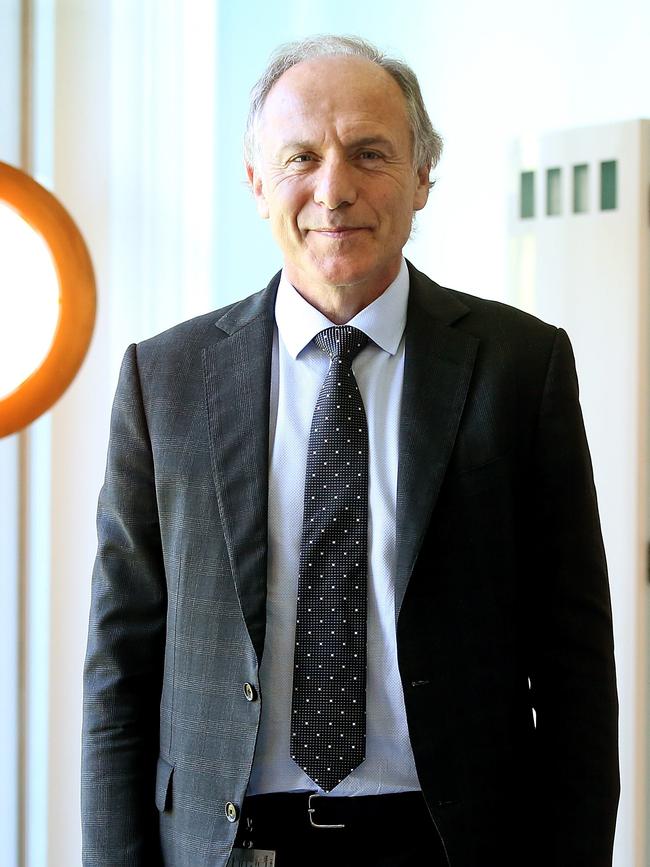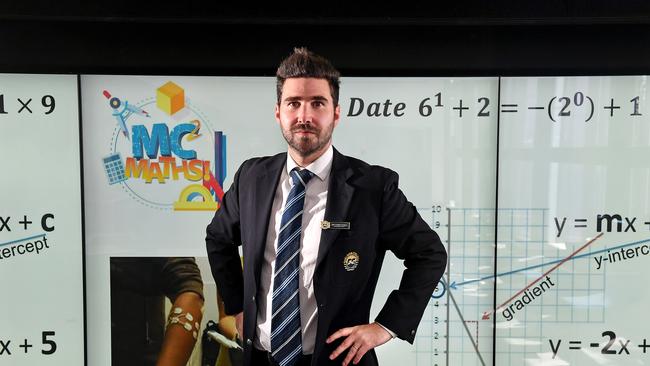Education:‘Time to take a chainsaw to the curriculum’
As part of a new plan to reshape the national school curriculum, the Federal Government is looking at ways to fast-track professionals to retrain as teachers.
Education
Don't miss out on the headlines from Education. Followed categories will be added to My News.
FEDERAL Education Minister Dan Tehan wants to “take a chainsaw to the curriculum’’ and bring back the basics of literacy and numeracy to stop Australia’s shocking slide in schooling standards.
Mr Tehan said the national school curriculum had become “cluttered” with non-core subjects such as gender issues and road safety.
“It is time to take a chainsaw to the curriculum,” Mr Tehan said. “We need to put literacy and numeracy back to the heart of the curriculum, and hopefully get something implemented by 2021.”
Mr Tehan also blasted the academic jargon used in some teaching materials, homework and assignments.
“Each sector (of education) is almost developing their own language,” he said.
“It’s shutting large swaths of the community out, trying to understand what the hell they’re talking about.
“It can take a couple of months to understand the acronyms and the language – they’ve got to be able to communicate in a way that people can understand it.”
The Sunday Mail revealed in September that students were confused by complicated curriculum jargon that was “driving teachers batty”.
Mr Tehan said students must master the basics of reading, writing and mathematics before “expanding to other areas of knowledge”.
“Our students are being asked to run before they can walk,” he said. “I’m surprised at how quickly students move away from learning the fundamentals. In every school I’ve visited around the nation, the feedback from teachers has been that the curriculum is too cluttered and it’s become a tick-a-box exercise.”
Mr Tehan said he was pleased that Queensland Education Minister Grace Grace had agreed to simplify the syllabus ahead of a meeting with state and territory ministers on Wednesday.
The federal minister, who will have three children in high school next year, said he was “surprised and disappointed” that the latest OECD Programme for International Student Assessment (PISA) showed Australia’s 15-year-olds had fallen years behind the rest of the world in maths, reading and science.
Australia now ranks 29th among developed countries in mathematics – down from 11th place in 2003 – and has slipped from 8th to 15th place in science and from 4th to 16th place in literacy.
“Alarm bells should be ringing,” Mr Tehan said. “The biggest challenge we have is how do we get teachers who want to teach mathematics?”
Australia’s Chief Scientist warned students had “too much choice” of subjects and slammed universities for failing to force students to study maths and science at school.

Dr Alan Finkel – a neuroscientist, engineer and entrepreneur – demanded schools “raise the bar” for achievement in core subjects such as English, maths and science.
And he called on universities to require high-level maths and science subjects as a prerequisite for courses such as engineering and medicine.
Dr Finkel said schools were introducing new subjects such as psychology and legal studies but should focus on “core subjects” such as maths, English and physics for students planning a career in engineering or science.
“I believe part of the problem is too much choice,” Dr Finkel said. “Schools should focus on core subjects.”
Dr Finkel said schools could not teach the so-called “21st century” skills of critical thinking, creativity and collaboration before students have mastered the basics.
“You can’t just teach those skills – you have to teach them the maths, physics, geography and literature,” he said. “There is value in schools teaching core subjects and doing that well.”
Dr Finkel said high school students must study advanced maths to “flourish at uni” in courses such as engineering.
“You need to be really skilled in mathematics – it’s really important,” he said.
“But at the moment universities are not signalling to students contemplating degrees in engineering and architecture and economics the importance of maths.
“Students believe the teachers who tell them that by dropping down maths (to an easier level) they can get a better ATAR (Australian Tertiary Admissions Rank) score.
“But the last thing you want to do is spend four years scraping through a university degree and having trouble getting a job.”
Mr Tehan said he would look at ways to fast-track professionals including scientists, engineers and accountants to retrain as teachers, to plug a crippling shortage of maths and science teachers.
He said he wanted Queensland, NSW and South Australia to lift their bans on the Teach for Australia program, which has retrained 832 professionals to teach in 182 schools in Victoria, the ACT, Tasmania, Western Australia and the Northern Territory.

Brisbane maths teacher Chris Niven – who heads the maths department at Sheldon College – studied accounting and finance in the UK before retraining as a maths teacher.
“I love teaching,” he said.
“You’re part of a team, it’s a good feeling when you’ve taught a really good lesson and know it’s impacted the students, and I get to travel during school holidays at the end of the year.”
Mr Niven was awarded a teaching excellence prize from the Australian Mathematical Sciences Institute this year.
Confused by the curriculum? Send your homework horror stories to natasha.bita@news.com.au



